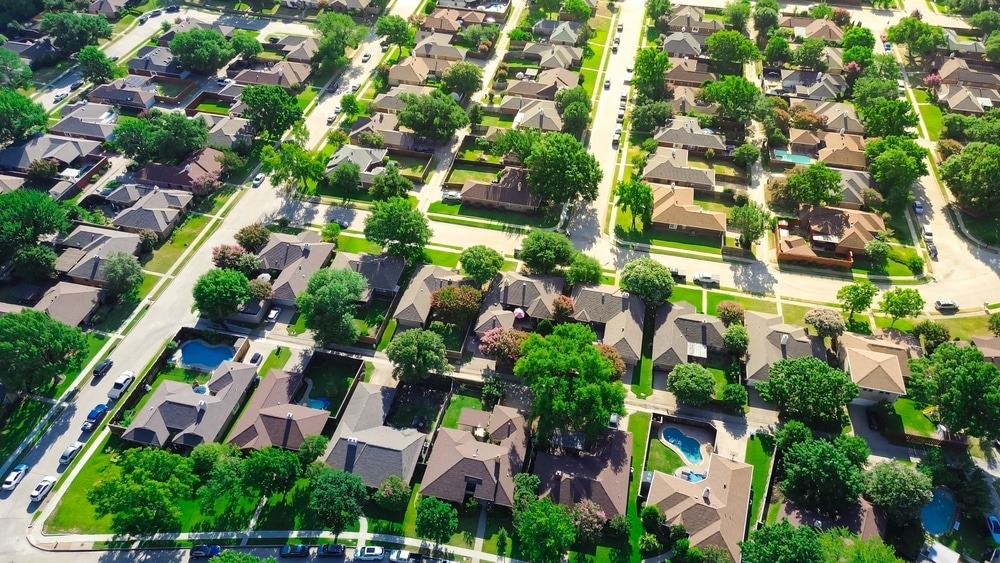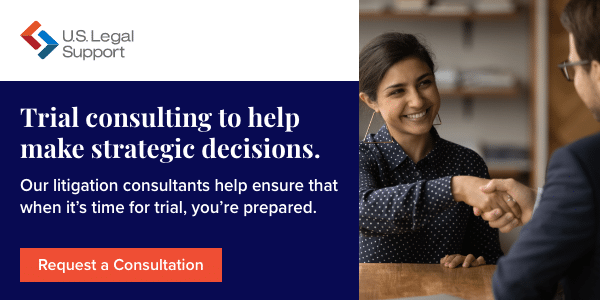The Impact of Venue Evaluation on Trial Outcomes

While a case must be filed in the court system that has the authority to adjudicate it, the specific venue is often a more flexible choice. To that end, selecting the right venue can be a key part of case strategy.
In fact, where you file can impact outcomes—not just which side prevails, but even down to the likely size of a settlement. In the past, lawyers took an educated guess at which court was likely to offer the most luck based on a combination of anecdotal evidence and networking.
Today, careful data analysis and venue expertise can provide objective guidance and predictive insights to improve your case outcomes.
Venue vs. Jurisdiction
While venue typically refers to the geographic location of a given court, jurisdiction encompasses a court system’s authority over the issue at hand.
Jurisdiction must be established when a case is filed to ensure that the court has the legal authority to decide a matter. Whether an action is transitory or local, the court must, as a matter of law1:
- Have authority over the subject matter of the case, and
- Be able to exercise control over the persons, entities, or property locations of a case.
Venue, on the other hand, refers to the particular court that a lawyer or plaintiff selects to file a case in, within the appropriate jurisdiction. When there isn’t a strict legal requirement to file in one specific venue, the selection often defaults to convenience, cost, and logistics based on:
- Location of a contract execution, accident, crime, or other triggering event
- Principal plaintiff and/or defendant place of home or business
- Access to the majority of witnesses
The venue is initially selected by virtue of filing within it, which puts the choice in the filing party’s hands.
Either party can challenge and request a change of venue but the motion won’t always be granted.2 The request must detail a rationale or supply evidence to support its necessity, such as the potential for a biased jury pool based on public outrage, infamy, or local media bias.
Understanding Venue Evaluation in Legal Cases
When it comes to venue evaluation, there are specific, objective factors that can be researched and considered. No one element offers a guarantee of a desired outcome, but considering these factors can provide you with critical information that influences your client’s chances.
Demographics
Who lives in the area? Demographic research allows you to fill in the outline of the people critical to your case outcome. While your jury pool is of prime importance, demographics also play a role in news coverage leanings and overall public opinion.
Demographic and psychographic criteria that can be gathered and evaluated include:
- Age range and stage of life
- Family and household makeup and living situations
- Income average
- Unemployment levels
- Education levels
- Homeownership to rental ratio, and home values and rent rates
- Political leanings
- Affiliations
While some of these elements seem like building blocks for simple stereotypes, demographic analysis often leads to unexpected results since it combines multiple factors and trends that change over time.
Judicial Tendencies
The judge assigned to your case can make or break its outcome through a combination of habits, expectations, and biases. If you’re able to assess the judges available at a given venue, it can help you predict how a given case’s argument and evidence may be supported or challenged.
For many lawyers, negative past experiences can create lasting impressions about certain judges and their venues, but objective data provides a more accurate picture than individual anecdotes. Plus, the rate of turnover differs across jurisdictions, so having current data is critical when it comes to judicial tendencies.
Look for comparative analytics and data visualizations on venue judges, such as3:
- Case types
- Motion outcomes
- Appeal results
- Opinions authored
- Frequently cited cases and other judges
- Political affiliations
- Biographical data
Historical Case Outcomes
If the past is the best predictor of the future, then comparing outcomes at a venue level before selecting the best environment for your case is a must. Within a given jurisdiction, look for apples-to-apples results between venues, such as:
- Average settlement amount
- Number of cases tried
- Tendency toward plaintiff judgments
- Maximum and minimum settlement amounts
Of course, no one case is an exact cookie cutter from a generic average. Specific context and circumstance should also be taken into account, including:
- Demographics and sympathetic appeal of your client vs. the opposition
- Severity and nature of the injury, trespass, or crime
- Perception of fault
- Level of current financial need of your client
- Degree of risk acceptable to your client
How Venue Can Impact Trial Outcomes
Collecting the right data is the first step, but you need to interpret the results effectively to identify the venue differentials most likely to affect your trial results.
Jury Composition
Jury composition encompasses both individual and group characteristics. Once you’ve identified jury pool demographics, consider how they’re likely to impact the average juror’s:
- Understanding of scientific or complex evidence
- Sympathy or empathy for your client
- Shared values or experience with either your client or the opposition
Additionally, once a jury is selected, individual jurors’ leanings and votes may be influenced by:
- Fellow jurors who have training, talent, or experience with assertiveness or leadership
- Insecurities about affluence, age, education, etc., compared to other jurors
- The social dynamics of the jury as a whole
- Judges’ biases and tone, particularly for jurors accustomed to following established leadership hierarchies
Local Regulations and Court Procedures
Regulations and procedures can differ not just at state and federal levels but also down to county, city, and other local levels. Evaluate any regulations that could impact:
- Statute of limitations – Include the establishment of a date that starts a clock ticking, such as a trigger event vs. “when a plaintiff reasonably should have discovered an injury.”4
- Time limits – Deadlines are critical at a procedural level in addition to the statute of limitations. Venues may differ on time limits to file motions, provide notifications, respond to discovery requests, etc.
- Case limits – The level of detail in jurisdictional authority can vary widely based on local regulations. While some states or districts offer more choice of venue, others may be limited based on exact geographic factors, dollar amounts, etc.
- Efficiency – Two venue options may differ greatly in how quickly a case is able to proceed to completion. Consider the congestion level of a given court venue and how backed-up the schedule is, as well as the average time from filing to resolution.
Strategic Venue Selection for Optimal Results
Attorneys can leverage venue analysis to strengthen their case by harnessing data and venue analysis expertise. In addition to classic quantitative and qualitative methods of information-gathering, machine learning models can consider venue as one among multiple factors to help predict:
- Case outcomes
- Settlement values
- Criminal sentences
AI-enhanced data analysis, pattern detection, and predictive summaries are also useful legal research approaches, so long as they’re:
- Steered and interpreted with both courtroom and behavioral science expertise
- Based on high-quality raw data sources
- Effectively trained and prompted by legal specialists
The Role of Jury and Trial Consulting in Venue Evaluation
Expert jury consulting is a critical factor in trial outcomes, and in particular, helping to understand if your client can get a fair trial and/or the best outcome in the current venue. Jury consultants can help you determine whether to push for a change of venue and how doing so could work for or against your client.
The process is highly data-driven, typically employing a combination of information gathering and analysis based on:
- Surveys and polls
- Focus groups
- Community attitude research
- Venue evaluation research (demographics, judicial tendencies, court statistics, etc.)
Jury consultants investigate and report on:
- The backgrounds, characteristics, and patterns of a community
- How those factors are likely to contribute to beliefs and behaviors
- Biases to look out for
- What trial elements, messages, and opening or closing arguments will be most impactful
Furthermore, they’re often at legal teams’ sides during jury selection, offering live insights during voir dire. They can also provide:
- Juror profiling
- Shadow juries
- Mock proceedings
- Witness preparation
Jury consulting expands upon and clarifies venue evaluation, addressing complex questions that require both courtroom experience and behavioral expertise.
Enhancing Trial Success Through Venue Evaluation
Effective venue evaluation is a valuable tool that can boost your chance of a successful trial. Demographics, judicial makeup, and past trial outcomes can provide objective information that, combined with effective data analysis and jury consulting, will help you select the ideal venue and inform your trial strategy.
TrialQuest, a division of U.S. Legal Support, delivers the deep knowledge and experience that attorneys and firms nationwide rely on for venue evaluation and jury consulting.
We’ve provided key trial consultation in more than 53,000 high-risk trials, arbitrations, and mediations across nearly all practice areas and jurisdictional levels. From discovery to judgment, we partner with legal teams on venue research and analysis, jury research, profiling, and selection, voir dire consulting, early risk assessment, and shadow juries.
We also cover mock trials, witness preparation, trial graphics and demonstratives, and trial presentation and technology services.
Learn more today about how we can help with your venue evaluation, jury consulting, and other trial preparation needs.
Sources:
- American Bar Association. How Courts Work. https://www.americanbar.org/groups/public_education/resources/law_related_education_network/how_courts_work/jurisdiction/
- O’Flaherty Law. Understanding the Difference Between Jurisdiction and Venue. https://www.oflaherty-law.com/learn-about-law/understanding-the-difference-between-jurisdiction-and-venue
- Columbia Law School. Researching Judges for Clerkships and Internships. https://guides.law.columbia.edu/judges
The Jensen Litigation Firm, PLLC. 100 Civil Litigation Mistakes To Avoid In Minnesota Courts. https://www.jensenlawmn.com/100-civil-litigation-mistakes-mn

Editoral Policy
Content published on the U.S. Legal Support blog is reviewed by professionals in the legal and litigation support services field to help ensure accurate information. The information provided in this blog is for informational purposes only and should not be construed as legal advice for attorneys or clients.


